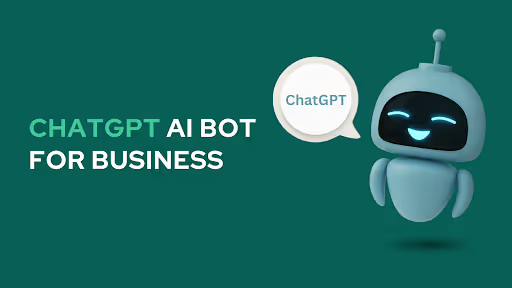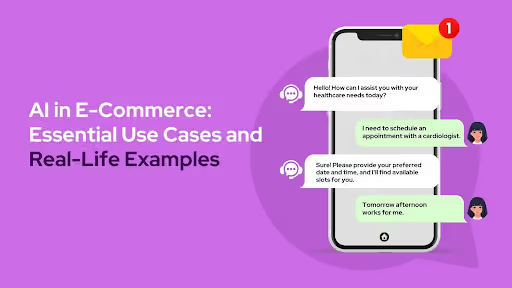AI Chatbots for Better Customer Support in E-commerce
.avif)
Matt Gillin, CEO of Relay Network, once said, “The chatbot benefit is the ability to close the loop with the customer along a process, efficiently and in a delightful way.” This perfectly captures what customer support AI chatbots for e-commerce can bring ideally—efficient, seamless support that resolves issues and enhances the customer experience.
AI chatbots are reshaping how e-commerce businesses engage with customers, offering personalised interactions, real-time assistance, and automated processes that save both time and money.
Let’s explore the specific ways in which AI chatbots are revolutionising customer support for online stores.
- 24/7 Availability Ensuring Help Anytime
AI chatbots offer round-the-clock customer support, helping businesses assist customers even after business hours. This ensures that no query goes unanswered and every customer feels attended to, no matter the time zone.
- Immediate Help and Real-Time Query Resolution
With instant responses, chatbots provide real-time query resolution, reducing wait times and boosting customer satisfaction. Whether checking order status or providing product details, AI chatbots can resolve most issues on the spot.
- Handling of Multiple Customer Inquiries Simultaneously
We all know how much humans hate waiting, AI chatbots can manage several customer conversations at once, eliminating the need for customers to queue up. This multitasking capability ensures that businesses can cater to high volumes of inquiries without delays.
- Reduction of Operational Costs Through Automation
AI chatbots drastically reduce operational costs by automating routine customer support tasks such as order tracking and FAQ responses. Businesses can focus on more complex tasks, leaving the routine inquiries to the chatbot.
- Personalised Product Recommendations
AI chatbots can analyse customer behaviour and preferences to suggest relevant products, enhancing the customer shopping experience and boosting conversion rates. This personalisation also helps in cross-selling and upselling.
- Real-Time Updates on Order Status and Stock Levels
Keeping customers informed about their orders and stock levels builds trust. AI chatbots can provide real-time updates on orders and alert customers if a desired product is back in stock, improving overall customer satisfaction.
Key Features of Effective Ecommerce AI Chatbots
To deliver optimal customer support, e-commerce chatbots must be equipped with specific features that make them highly effective and versatile. These features improve the customer experience and allow businesses to streamline operations. Let’s dive into the key attributes that set top-performing e-commerce chatbots apart:
- Omnichannel Support Across Websites, Social Media, and Apps
Effective AI chatbots, like LimeChat offer seamless omnichannel support, engaging customers wherever they are—on websites, social media platforms, or mobile apps. This ensures a consistent experience across all touchpoints, reducing friction and enhancing customer satisfaction.
- Multilingual Capabilities
With natural language processing (NLP) and translation engines, e-commerce chatbots can converse fluently in multiple languages, effectively allowing businesses to serve global customers. This ensures no communication barriers, fostering a better customer relationship.
- Integration with CRM Systems
An effective chatbot integrates smoothly with customer relationship management (CRM) systems, using customer data to provide personalised responses. This ensures that customers receive relevant information and recommendations based on their history and preferences.
- Custom Analytics and Performance Monitoring
Tracking chatbot performance is critical to ensuring customer satisfaction. Effective chatbots offer custom analytics and detailed reports, allowing businesses to monitor interactions and optimise the chatbot’s performance based on real-time data.
- Real-Time Updates and Notifications
A chatbot’s ability to send real-time updates, whether about orders, stock levels, or promotions- keeps customers always informed. This kind of proactive communication strengthens customer trust and loyalty.
Implementing AI Chatbots in E-commerce
For eCommerce businesses, implementing AI chatbots requires a strategic approach to ensure they deliver maximum value. From automating routine tasks to improving customer engagement, here’s how AI chatbots can be effectively integrated into your operations:
- Automating Routine Tasks
AI chatbots can automate routine tasks like order processing, tracking, and returns. This saves time and ensures consistent accuracy in customer interactions, reducing the workload for human agents.
- Supporting Conversational Commerce
AI chatbots can enhance conversational commerce by guiding customers through the buying journey. Whether answering product queries or assisting with checkout, chatbots provide a personalized and interactive shopping experience that leads to higher conversion rates.
- Using Data to Analyze Customer Preferences
By leveraging customer data from interactions, AI chatbots can help businesses better understand customer preferences and pain points. This data-driven approach enables businesses to create targeted marketing strategies and improve their offerings.
- A/B Testing Different Responses for Effectiveness
AI chatbots allow businesses to test different responses or approaches during customer interactions. A/B testing enables enterprises to determine which responses lead to better engagement, conversion, or satisfaction, ultimately optimizing chatbot performance.
- Ensuring Compliance with Privacy Regulations
As data privacy becomes a global concern, many countries have introduced regulations like the EU's GDPR (General Data Protection Regulation). Businesses must ensure their chatbots handle customer data responsibly and comply with relevant privacy laws. Whether it’s GDPR in Europe or other local data protection regulations, compliance is crucial to maintaining customer trust and avoiding potential penalties.
Utilizing AI Chatbots to Address Common E-commerce Challenges
AI chatbots aren’t just about answering customer questions—they can actively help businesses overcome common e-commerce hurdles. Chatbots provide solutions to online retailers' challenges through automation and real-time engagement. Here’s how AI chatbots address vital issues:
- Reducing Cart Abandonment
Cart abandonment has many reasons—unexpected additional costs, the thought of “Do I want this?”, lack of preferred payment options, account creation requirements, security concerns, or unclear return policies. E-commerce companies constantly strive to reduce cart abandonment and improve their conversion rates. AI chatbots can step in by sending timely reminders to customers who have left items in their carts and offering personalized incentives or discounts, encouraging them to complete their purchases. Also, learn how to use WhatsApp for abandoned cart recovery.
- Generating Leads
Chatbots can initiate conversations with site visitors, gathering essential information and qualifying leads. By engaging users early in their journey, chatbots create opportunities to convert potential buyers into loyal customers.
- Offering Personalized Recommendations and Promotions
AI chatbots can analyze customer behavior and preferences to offer personalized product recommendations and promotions. This enhances the shopping experience and boosts sales through targeted offers.
- Collecting Valuable Customer Feedback
Chatbots can gather customer feedback through surveys, polls, and post-purchase queries. This feedback is invaluable for businesses looking to refine their products, improve their services, or identify areas of customer dissatisfaction.
In the TEDx talk "Intelligent ChatBots" by Sophie Hundertmark, she explores how AI chatbots are revolutionizing customer service and business operations. Sophie explains how chatbots can save time and money by automating simple customer interactions, generating qualified leads, improving user experience, and offering 24/7 support. With real-world examples, she demonstrates the growing importance of chatbots in enhancing business efficiency and customer satisfaction.
Top AI Chatbots for E-commerce
When choosing an AI chatbot for your e-commerce business, finding one that aligns with your specific needs and offers the right features is essential. Let’s look at some of the top AI chatbots that are making waves in the e-commerce industry:
- LimeChat
LimeChat is a standout AI chatbot explicitly designed for e-commerce businesses. With its advanced omnichannel support, LimeChat integrates across websites, social media platforms, and apps, ensuring a smooth and consistent customer experience.
LimeChat excels in personalization, offering tailored product recommendations based on customer behaviour. Its multilingual capabilities allow it to engage customers across the globe, and with real-time analytics and performance monitoring, businesses can track and optimize chatbot interactions.
LimeChat also adheres to GDPR compliance, prioritizing data security and privacy—a must for modern e-commerce businesses. Brands that have implemented LimeChat have seen significant improvements in customer engagement, reduced cart abandonment, and higher conversion rates, making it a top choice for e-commerce businesses looking for an AI-powered solution.
- Zowie
Zowie offers powerful automated email management and upselling capabilities, helping e-commerce businesses streamline their customer communications. It also excels at personalizing responses and identifying customers' needs through AI-powered data analysis.
- Botsonic
Botsonic uses GPT-4 technology and a no-code builder, making it an easy-to-implement option for businesses looking to deploy AI chatbots without any coding expertise. With its multichannel support, Botsonic provides a seamless customer experience across different platforms.
- Botsify
With GPT-3.5 and GPT-4 capabilities, Botsify is an excellent choice for e-commerce businesses aiming to reach a global audience. It offers multilingual support and advanced conversational features, making it highly effective for customer engagement.
- Ada
Ada stands out for its no-code builder and A/B testing features, which allow businesses to optimize chatbot responses easily. Focusing on improving customer interactions, Ada provides tools to test different approaches and improve the overall user experience.
- Giosg
Giosg provides a no-code builder and custom performance reporting tools, allowing businesses to track the success of their chatbot interactions and make data-driven improvements. It’s an excellent option for companies looking to continuously improve their chatbots' effectiveness.
Let us look at a comparative table for the various AI chatbots based on the relevant features:

This table helps you quickly assess which chatbot suits your e-commerce needs based on critical features.
Choosing the Right AI Chatbot for Your E-commerce Business
Selecting the best AI chatbot for your e-commerce business depends on several key factors. With multiple options available, it's essential to consider the following aspects to ensure you pick the right solution for your specific needs:
- Assess Business Needs and Desired Features
Start by identifying your business requirements and how a chatbot can address them. Omnichannel support becomes crucial if your brand operates across multiple platforms, such as your website, Instagram, and Facebook. A chatbot like LimeChat that seamlessly integrates with these platforms ensures consistent customer engagement, no matter where your customers interact with your brand.
Multilingual capabilities should be a top priority if your business targets a diverse, global customer base. For example, if you're selling products across regions with different languages—say in India, where customers may prefer interacting in Hindi, English, or regional languages, a chatbot with robust multilingual support like Zowie or Botsonic can help you effectively cater to these varying preferences.
Additionally, CRM integration might be more critical if you're focused on providing personalized experiences based on customer data. For example, if your business relies on tracking customer preferences and purchase history, integrating with your CRM system ensures your chatbot can offer tailored product recommendations, which enhances customer satisfaction and retention.
- Considering Integration Capabilities
Your business may already use various tools like CRM systems, email marketing platforms, or order management systems. Ensuring the chatbot integrates seamlessly with these existing tools is critical. For example, a CRM-integrated chatbot can pull data in real time, enabling it to offer personalized support based on previous interactions or order history, making the customer experience more fluid and connected.
- Evaluating Ease of Use and Setup
If your business doesn’t have a dedicated tech team, a chatbot with a no-code builder, such as Botsonic or Ada, might be the best option. These chatbots are designed for ease of use, allowing non-technical staff to set up and manage the chatbot with minimal effort, saving time and resources while maintaining high functionality.
- Checking Pricing and Scalability Options
As your business grows, your customer support demands will increase. It’s essential to choose a chatbot that can scale with your company. For instance, if you’re currently handling hundreds of customer inquiries but expect to scale to thousands, a scalable chatbot like LimeChat that offers real-time analytics can help you adjust without losing efficiency. Additionally, ensure the chatbot fits your budget now and as you expand, keeping an eye on subscription models or per-interaction costs.
Best Practices for Using AI Chatbots in E-commerce
Once you've selected the right AI chatbot for your business, following best practices to maximize its effectiveness is important. A well-executed chatbot strategy can elevate customer experiences and drive sales. Here are some best practices to consider:
- Ensuring Clear and Immediate Communication
Customers expect quick and straightforward responses. Ensure your chatbot is programmed to provide concise, helpful answers that efficiently address customer queries. For instance, if a customer asks about an order status, the chatbot should respond instantly with real-time updates, ensuring no communication delays.
- Humanizing the Chatbot with Brand Voice
Your chatbot should reflect your brand's personality to create a more relatable and engaging experience. For example, if your brand has a friendly and approachable tone, ensure the chatbot mirrors this in its responses. This helps build customer trust and rapport, making interactions feel more personal and less robotic.
- Personalizing Interactions Based on Customer Data
Leverage customer data to personalize conversations. For instance, if the chatbot recognizes returning customers, it could greet them by name and offer personalized product recommendations based on their previous purchases. This level of personalization increases engagement and can lead to higher conversion rates.
- Keeping the Chatbot Script Up-to-Date
Regularly update the chatbot’s script to reflect new products, policies, or promotions. Ensure the chatbot is equipped with the latest information to provide accurate answers to customer queries. For example, if you're running a limited-time offer, ensure the chatbot can share the details and drive sales during the campaign period.
- Using Chatbots for Marketing, Upselling, and Data Collection
Your chatbot can do more than answer questions, it can also be a powerful marketing tool. Use it to promote new products, upsell complementary items, and gather valuable customer insights. For instance, after a customer makes a purchase, the chatbot could suggest related products or ask for feedback through a quick survey, helping you continuously improve your services.
Conclusion
AI-powered customer support solutions are revolutionizing the e-commerce landscape, enabling businesses to deliver real-time, personalized assistance around the clock. By integrating a customer support AI chatbot for e-commerce, brands can streamline operations and enhance customer satisfaction and loyalty. The right chatbot can be the difference between abandoned carts and completed sales.
LimeChat stands out with its omnichannel support, real-time updates, GDPR compliance, and many more features, making it a reliable choice for e-commerce businesses. By automating routine tasks and providing personalized experiences, LimeChat helps companies improve customer engagement and conversion rates.
Ready to transform your e-commerce customer support? Implement LimeChat today and unlock the potential of a customer support AI chatbot designed to elevate your business.
Transform your marketing and support today






.avif)